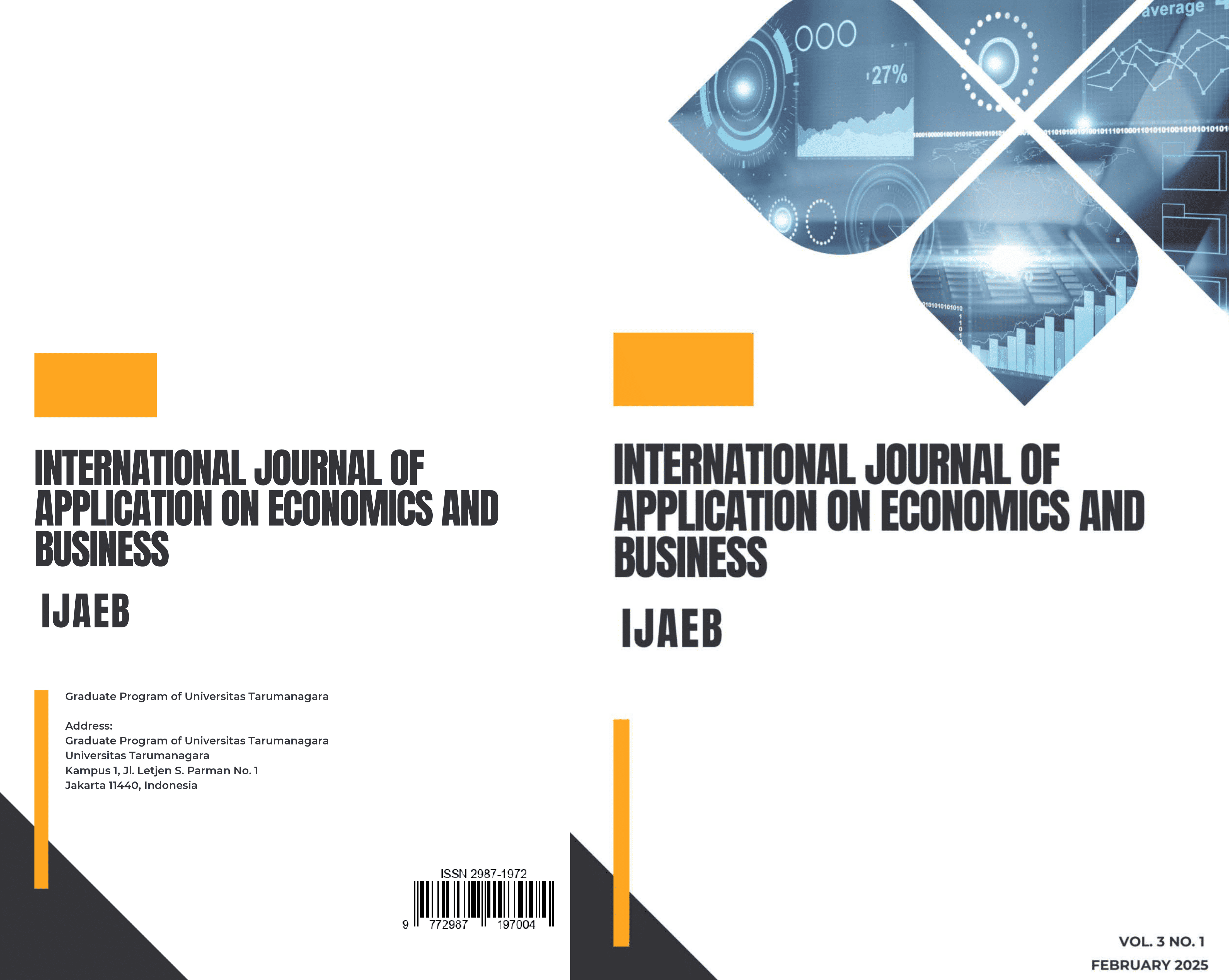FOSTERING ENTREPRENEURIAL INTENTIONS AMONG STUDENTS
Main Article Content
Abstract
The high unemployment rate in Indonesia is caused by rapid population growth, which causes an imbalance between the number of job seekers and the available jobs. One strategy that can be used to reduce unemployment is to exploit entrepreneurial potential. Therefore, researchers are interested in examining factors that might influence Tarumanagara University students' desire to become entrepreneurs. This research aims to determine the influence of self-efficacy, parents' socio-economic status, and entrepreneurship education on entrepreneurial intentions among undergraduate management students at Tarumanagara University. The theory of planned behavior serves as the theoretical foundation in conducting research. The research design used is quantitative with descriptive methods. The sampling technique used a purposive sampling technique. Data was collected using an online questionnaire with a sample size of 133 respondents. The data analysis technique used is Structural Equation Modeling. Data processing was carried out using SmartPLS software version 4.0. The results of this research show that self-efficacy does not have a positive and insignificant influence on entrepreneurial intentions, parents' socio-economic status has a positive and significant influence on entrepreneurial intentions, and entrepreneurship education has a positive and significant influence on entrepreneurial intentions. The results of this research can be a basis for educational institutions and the government to design programs that strengthen student self-efficacy, increase the accessibility of entrepreneurship education, and reduce socio-economic disparities.
Article Details
Section

This work is licensed under a Creative Commons Attribution-NonCommercial-ShareAlike 4.0 International License.
This journal provides immediate open access to its content on the principle that making research freely available to the public supports a greater global exchange of knowledge.
IJAEB by Graduate Program of Universitas Tarumanagara is licensed under a Creative Commons Attribution-NonCommercial-ShareAlike 4.0 International License.. Permissions beyond the scope of this license may be available at https://journal.untar.ac.id/index.php/ijaeb
References
Ajzen, I. & Fishbein, M. (1980), Understanding Attitudes And Predicting Social Behaviour, Englewood Cliffs, Prentice Hall, London.
Ajzen, I. (1991). The theory of planned behavior. Organizational behavior and human decision processes, 50(2), 179-211. https://doi.org/10.1016/0749-5978(91)90020-T
Andika, M., & Madjid, I. (2012). Analisis Pengaruh Sikap, Norma Subyektif dan Efikasi Diri terhadap Intensi Berwirausaha pada Mahasiswa Fakultas Ekonomi Universitas Syiah Kuala. Eco-Entrepreurship, 1(1), 190-197. https://doi.org/10.1007/978-1-4419-0143-0
Anggraeni, D. A. L., & Nurcaya, I. N. (2016). Peran Efikasi Diri dalam Memediasi Pengaruh Pendidikan Kewirausahaan terhadap Niat Berwirausaha. E-Jurnal Manajemen Unud, 5(4), 2424-2453. Retrieved from https://ojs.unud.ac.id/index.php/manajemen/article/view/17664
Badan Pusat Statistik. (2023). February 2023: Open Unemployment Rate (TPT) is 5.45 Percent and Average Labor Wage is 2.94 Million Rupiah per Month. Accessed from https://www.bps.go.id/id/pressrelease/2023/05/05/2001/februari-2023-tingkat-pengangguran-terbuka--tpt--sebesar-5-45-persen-dan-rata-rata-upah-buruh-sebesar-2-94-juta-rupiah-per-bulan.html
Burnama, N. O. C., & Fitrayati, D. (2019). Pengaruh Status Sosial Ekonomi Orang Tua Dan Sikap Berwirausaha Terhadap Intensi Berwirausaha Mahasiswa Pendidikan Ekonomi Unesa. Jurnal Pendidikan Ekonomi (JUPE), 7(3), 99-104. https://doi.org/10.26740/jupe.v7n3.p99-104
Chimucheka, T. (2017). The Impact of Entrepreneurship Education on the Establishment and Survival of Small , Micro and Medium Enterprises (SMMEs) The Impact of Entrepreneurship Education on the Establishment. Journal Economics, 4(2), 157–168. https://doi.org/10.1080/09765239.2013.11884975
Devi, E. A., & Hadi, N. U. (2018). Pengaruh Pendidikan Kewirausahaan, Peran Orang Tua terhadap Intensi Berwirausaha Mahasiswa STKIP PGRI Tulungagung. JPEK: Jurnal Pendidikan Ekonomi dan Kewirausahaan, 2(1), 1-18. https://doi.org/10.29408/jpek.v2i1.712
Doan, X., & Phan, T. (2020). The impact of entrepreneurial education on entrepreneurial intention: The case of Vietnamese. Management Science Letters, 10(8), 1787–1796. https://doi.org/10.5267/j.msl.2019.12.040
Florina, S., & Zagoto, L. (2019). Efikasi Diri Dalam Proses Pembelajaran. Jurnal Review Pendidikan Dan Pengajaran, 2(2), 386–391. https://doi.org/10.31004/jrpp.v2i2.667
Hair, et al. (2017). A Premier on Partial Least Squares Structural Equation Modeling (PLS-SEM) 2nd Edition. Los Angeles, London, New Delhi, Singapore, Washington DC, Melbourne: SAGE
Hair, J. F., Ringle, C. M., & Sarstedt, M. (2011). PLS-SEM: Indeed, a Silver Bullet. Journal of Marketing Theory and Practice, 19 (2), 139-152. Doi 10.2753/MTP1069-6679190202.
Hasan, H. A. (2020). Pendidikan Kewirausahaan: Konsep, Karakteristik dan Implikasi dalam Memandirikan Generasi Muda. JURNAL PILAR: Jurnal Kajian Islam Kontemporer, 11(1), 99-111. https://journal.unismuh.ac.id/index.php/pilar/article/view/4909
Indarti, N., & Rostiani, R. (2008). Intensi Kewirausahaan Mahasiswa: Studi Perbandingan Antara Indonesia, Jepang Dan Norwegia. Jurnal Ekonomi & Bisnis Indonesia (Fakultas Ekonomi Dan Bisnis Universitas Gadjah Mada), 23(4), 369–384. https://doi.org/10.22146/jieb.6316
Kalyoncuoğlu, S., Aydıntan, B., & Göksel, A. (2017). The Effect of Entrepreneurship Education on Entrepreneurial Intention: An Experimental Study on Undergraduate Business Students. Journal of Management Research, 9(3), 72-91. https://doi.org/10.5296/jmr.v9i3.11282
Mawaddah, H. (2019). Analisis Efikasi Diri pada Mahasiswa Psikologi Unimal. Jurnal Psikologi Terapan, 2(2), 19-26. https://doi.org/10.29103/jpt.v2i2.3633
Meinawati, N. (2018). Pengaruh Latar Belakang Keluarga dan Pendidikan Kewirausahaan terhadap Intensi Berwirausaha melalui Efikasi Diri. Indonesian Journal Of Economics Education, 1(1), 55–64. https://doi.org/10.17509/jurnal
Noor, Y. M., Hong, L. M., binti Ibrahim-Zakaria, A. N., Mud, N. N. B. N., & Yunoh, M. N. M. (2019). The Factors Influencing Small Medium Enterprise (SMEs) Success in Kelantan. International Journal of Innovation, Creativity and Change, 6(3), 55-64. http://hdl.handle.net/123456789/1599
Pratana, N., & Margunani, M. (2019). Pengaruh Sikap Berwirausaha, Norma Subjektif Dan Pendidikan Kewirausahaan Terhadap Intensi Berwirausaha. Economic Education Analysis Journal, 8(2), 533-550. https://doi.org/10.15294/eeaj.v8i2.31489
Pristian, R (2016). Pengaruh Status Sosial Ekonomi Orang Tua, Literasi Ekonomi Dan Life Style Terhadap Perilaku Konsumsi Mahasiswa Jurusan Pendidikan Ekonomi Ikip Pgri Bojonegoro. Jurnal Edutama, Vol 3, No. 2. Hal. 49-58. http://dx.doi.org/10.30734/jpe.v3i2.36
Rizqiyah, A. (2023). Continuing to Increase, the Number of Indonesian Youth Entrepreneurs Reaches 19%. Accessed from https://goodstats.id/article/terus-meningkat-jumlah-wirausaha-pemuda-indonesia-mencapai-19-persen-97TOM
Rosyanti, R., & Irianto, A. (2019). Pengaruh Pendidikan Kewirausahaan Dan Lingkungan Keluarga Terhadap Motivasi Berwirausaha Mahasiswa Jurusan Pendidikan Ekonomi Universitas Negeri Padang. Jurnal Ecogen, 2(3), 587. http://dx.doi.org/10.24036/jmpe.v2i3.7451
Sarstedt, M., Hair, J., & Ringle, C. M. (2017). Partial least square structural equation modeling. Springer International Publishing, 13, 1-41. http://dx.doi.org/10.1007/978-3-319-05542-8_15-1
Simatupang, T. S. (2020). Intensi Berwirausaha: Sebuah Konsep dan Studi Kasus di Era Revolusi Industri 4.0. Indramayu: Penerbit Adab.
Sugiyono. (2020). Metode penelitian kuantitatif, kualitatif, dan R&D. Bandung: Alfabeta.
Suryani, T. (2008). Perilaku konsumen Implementasi pada Strategi Pemasaran (Pertama). Yogyakarta: Graha Ilmu.
Thohir, M., Soesatyo, Y., & Harti, H. (2016). Pengaruh Status Sosial Ekonomi Orang Tua, Literasi Ekonomi dan Percaya Diri terhadap Minat Wirausaha Siswa SMP Negeri di Kecamatan Tenggilis Mejoyo Surabaya. Jurnal Ekonomi Pendidikan dan Kewirausahaan, 4(2), 149-163. https://doi.org/10.26740/jepk.v4n2.p149-163
Walter, S. G., & Block, J. H. (2016). Outcomes of entrepreneurship education: An institutional perspective. Journal of Business Venturing, 31(2), 216–233. http://dx.doi.org/10.1016/j.jbusvent.2015.10.003

